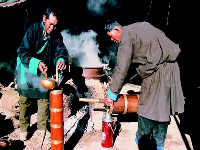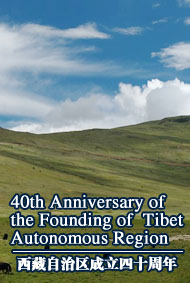|
Tibetan Tea Culture
( 2005-10-27 )
 In Southwest China's Tibet Autonomous Region, tea serves many purposes. It is a symbol of hospitality, a sacred offering, and a meal in itself. People drink the tea alongside flat cakes of ground corn, barley, or buckwheat, called tsamba. The tea is offered to guests in villages, monasteries, or private homes as a sign of hospitality, and must be consumed before conversation can begin. In Southwest China's Tibet Autonomous Region, tea serves many purposes. It is a symbol of hospitality, a sacred offering, and a meal in itself. People drink the tea alongside flat cakes of ground corn, barley, or buckwheat, called tsamba. The tea is offered to guests in villages, monasteries, or private homes as a sign of hospitality, and must be consumed before conversation can begin.
 Tea to Tibetans just as coffee to Westerners Tea to Tibetans just as coffee to Westerners
To the Tibetans, tea is a beverage that is just like coffee to the Westerners -- a wake-up and a shake-up drink to start the day on the right path.
In Tibet no morning can pass without drinking some tea, usually the sweet tea, while no meal can be complete without some tea, which is almost always Tibetan buttered tea.
The sweet tea, prepared by mixing milk and sugar with the juice from fully boiled fermented tealeaves, serves as the refresher.
Town folks prefer to go to ateahousefor sweet tea before going to work for the rest of their day. Teahouses sometimes stand as alternative places to find the ones who are otherwise expected in their workplace in the morning and in the early afternoon.
The Tibetan buttered tea is prepared by mixing butter and salt with the juice from fully boiled fermented tealeaves. Before serving, the mixture has to be further blended in a special blender.
More often than not, a slim wooden cylinder is used for the blending. After the mixture is put in the cylinder, a piston is used to push and pull inside the cylinder. With the passing of the mixture through the slit between the piston and the cylinder, the mixture of butter, salt, and tea is forcefully and thoroughly blended.
In Tibet, tea, whether sweet tea or Tibetan buttered tea, is served in small or large thermo flasks, as both kinds of tea are best when served hot.
|

